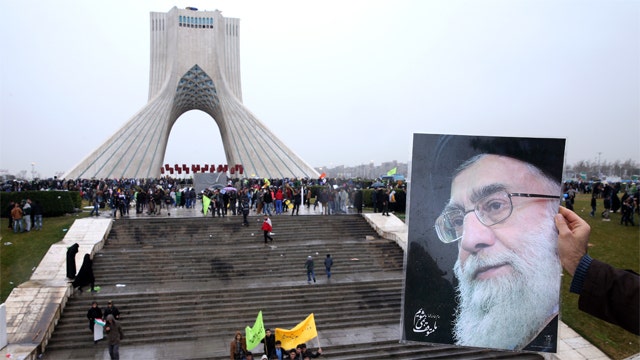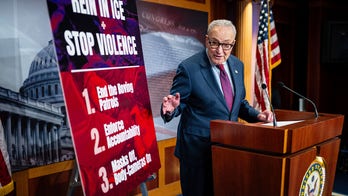Iran nuke deal a 'historical victory' or big mistake?
Fair and balanced debate after Obama wins critical backing in Congress
The Obama administration now appears to have enough support in Congress to stave off Republican efforts to reject the president's controversial Iran nuclear deal, after a retiring Maryland Democratic senator came out Wednesday morning in favor of the pact.
Sen. Barbara Mikulski, D-Md., announced her support for the deal as Secretary of State John Kerry delivered a lengthy and detailed address in Philadelphia defending the accord.
In his speech, Kerry disputed what he called "false information" circulating on the deal. He said, contrary to the views of many critics, that the deal provides "access" to keep Iran in check, preserves "every option" to respond if Iran balks, and has elements that will last "for the lifetime of Iran's nuclear program."
"President Obama and I are convinced beyond any reasonable doubt that the framework that we have put forward will get the job done," Kerry said.
But, with Mikulski's endorsement locked down, the speech served more as a public reminder of the administration's stance than a last-minute appeal for support.
Mikulski becomes the 34th senator to support the deal -- giving President Obama enough backing to sustain a veto of a Republican bill opposing it, should that bill pass in a vote later this month. Unless an announced supporter flips his or her vote, Obama would appear to have the crucial coalition in place to preserve the agreement on Capitol Hill.
"No deal is perfect, especially one negotiated with the Iranian regime," Mikulski said in a statement. "I have concluded that this Joint Comprehensive Plan of Action is the best option available to block Iran from having a nuclear bomb. For these reasons, I will vote in favor of this deal."
Her support, though, doesn't end what has been a raging debate. Opposition to the agreement among Republicans, among ex-military leaders and in Israel remains widespread.
"Forcing a bad deal, over the objections of the American people and a majority in Congress, is no win for President Obama," said Cory Fritz, spokesman for House Speaker John Boehner. "The White House may have convinced just enough Democrats to back an agreement that legitimizes Iran's nuclear program, trusts the regime to self-inspect and offers amnesty to terrorists, but this deal is far from being implemented."
The latest report warning of dire consequences from the agreement came Wednesday morning, from the Iran Strategy Council, a group of ex-senior military officials and defense analysts examining the deal for the The Jewish Institute for National Security Affairs. The group is co-chaired by retired Gen. James Conway, who served as Marines commandant in the beginning of the Obama administration, and retired Gen. Charles Wald.
"The [nuclear deal] will not prevent a nuclear Iran," the report said, warning of "potentially grave strategic implications" that threaten national security. "No later than 15 years, the deal's major nuclear restrictions will lapse, Iran will stand on the brink of nuclear weapons capability, and once again the United States will likely have to devote significant resources and attention to keeping Tehran from attaining nuclear weapons."
The group was referring to the sunset of major provisions after 15 years. But Kerry and others in the administration argue that even after that period, Iran will remain subject to the Nuclear Nonproliferation Treaty and have to abide by inspection requirements. Kerry also argued Wednesday that Iran's "covert pathway" to a bomb would be blocked, and that the intelligence community agrees Iran "could never get away" with establishing a "completely secret nuclear supply chain." He said rejecting a deal would hurt the U.S. and endanger the region.
Kerry also sent a letter Wednesday to all members of Congress outlining U.S. security commitments to Israel and the Gulf Arab states in light of the nuclear deal.
Republicans in Congress and running for president unanimously oppose the deal, which aims to curb Iran's nuclear program in exchange for relief from economic sanctions.
The Israeli government is vehemently against it, contending that concessions made to Iran could empower that country, which has sworn to destroy Israel. But critics struggled to use Congress' summer recess to turn the tide against the agreement, despite a multimillion-dollar lobbying campaign funded by the powerful American Israel Public Affairs Committee, or AIPAC.
Only two Democratic senators have come out against the deal -- Chuck Schumer of New York and Robert Menendez of New Jersey -- while in recent weeks undeclared Democratic senators, even from red states, have broken in favor one after another.
Each side, meanwhile, has been rolling out letters of support and opposition in the run-up to a vote.
The latest came this past weekend with a full-page letter in The New York Times signed by more than 200 retired military generals and admirals opposing the deal. "This agreement will enable Iran to become far more dangerous, render the Mideast still more unstable and introduce new threats to American interests as well as our allies," the letter, which previously had been sent to congressional leaders, reads.
Even if Congress had been able to pass the disapproval resolution, it couldn't completely stop the deal, which was agreed to among Iran, the United States, Britain, France, Germany, Russia and China. In July, the U.N. Security Council unanimously endorsed the nuclear deal, approving a resolution that would lift the international sanctions on Iran in 90 days.
The Associated Press contributed to this report.













































